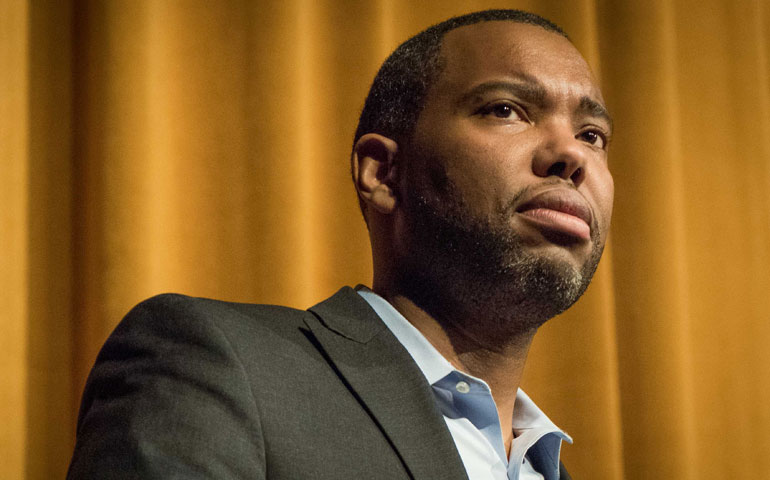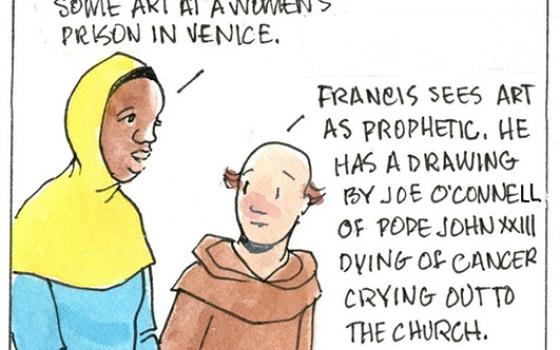
Ta-Nehisi Coates: On every page, he speaks love for black people in this country and for his son. (Wikimedia Commons/Eduardo Montes-Bradley)
 BETWEEN THE WORLD AND ME
BETWEEN THE WORLD AND ME
By Ta-Nehisi Coates
Published by Spiegel & Grau, $24
Since Ta-Nehisi Coates' lyric essay, Between the World and Me, arrived in my mailbox in September, Coates has completed a book tour and the book has garnered him a National Book Award. Its excellence, therefore, should come as no surprise to me or to readers of this review.
Nonetheless, I find myself struggling to narrow the scope of this review because Between the World and Me speaks to me as a reader, social change activist, Christian woman and creative writing student, and in all ways, it exceeds my expectations. At 152 pages, the book requires no more than two afternoons of a reader's attention, but it has the potential to stay with you and impact you for much longer.
Coates structures Between the World and Me as a three-part letter to his 15-year-old son in which he articulates the fear he lives with as a father unable to protect his son from America's historical plunder of black bodies. It is a fear passed down through generations since the first chained Africans arrived in the U.S., and one that Coates saw in his father's belt, his mother's verbal threats and the hypermasculine posturing of black boys on his block in urban Baltimore.
It is a fear that has not been erased by Coates' education at Howard University, his triumphant career as a journalist, his world travels, or by the role he has been cast in as an expert on race relations -- a phrasing that he says "serves to obscure that racism is a visceral experience, that it dislodges brains, blocks airways, rips muscle, extracts organs, cracks bones, breaks teeth."
It is a fear that was exacerbated by the killing of a college classmate by a Prince George's County police officer and by his own son's tears over the non-indictment of the officer who killed Michael Brown.
Certain that his son now understands this very real danger to the body, Coates implores him not to look away from it, but rather to pursue relentlessly "the question of how one should live within a black body, within a country lost in the Dream." It is the question of Coates' life. The knowledge he has gained in his pursuit of the question has enabled him to understand why he is powerless to protect his own son. In some ways, it has also helped him come to terms with his impotence.
I find his resolve neither reassuring nor disheartening. In early reviews of Between the World and Me, I sensed befuddlement over the book's absence of reconciliation. Coates often is compared to James Baldwin, and Baldwin closes The Fire Next Time, his 1962 letter to his nephew about surviving as a black man in America, with the belief that the small number of "relatively conscious" whites and blacks can "end the racial nightmare" by awakening others to the realities of racism in America and the cosmic destruction it is sure to reap.
Coates ends his letter on an image that metaphorically suggests the plunder of black bodies will never cease. He leaves readers with no solutions to end racism and instead suggests that America cannot function without it.
For most readers, this is an uncomfortable statement that might be true, but that we don't want to believe is true, under any circumstances, because the hopelessness would be unbearable. For Coates, however, truth (and the continued search for it) is his only comfort.
Coates does not find the truth he searches for in religion, nor does he ever consider looking for it there. Without the consolation of the belief in achieving freedom and bodily restoration in an afterlife, Coates was privileged in a way the majority of African-Americans, who are consistently found to be the most religious people in the nation, are not. He writes, "I was freed to truly consider how I wished to live -- specifically, how do I live free in this black body?"
He seeks no purpose, higher or otherwise, in black people's suffering. He has difficulty relating to black Christians' quickness to forgive oppressors and murderers. Life is given only once, and the body is life, soul, mind and self.
Truth is in the struggle and in love. On every page, Coates speaks love for black people in this country and for his son. He is especially powerful and poignant when he directly addresses and gives imperatives to his son. Coates wants his son to be allowed to express the vulnerability and tenderness that he himself was forced to suppress as a child for the sake of his survival.
Despite the permission Coates implicitly gives his son to question images of masculinity, Between the World and Me is a male-dominated narrative. It is a letter from father to son, about a black male's experience in the United States. Coates names a litany of writers, scholars, black history figures and Howard University alumni who have influenced him, and most of them are men.
Women rarely appear outside the role of mother, lover, friend or wife. And although Coates writes to his son, "The women around you must be responsible for their bodies in a way that you never will know," he also tells him, "You are the bearer of a body more fragile than any in this country." One gets the sense that the latter "you" is a directive to his son as a black male, not as a black person.
Interestingly, one of the other finalists for this year's National Book Award was Tracy K. Smith for her memoir, Ordinary Light (NCR, April 24-May 7, 2015), the story of a black girl growing up middle-class, in a household steeped in Christianity. Nonfiction writers seeking examples of excellence must read both books. Read them for advice to writers. Read them for their mix of logical and lyrical language. Read them to understand how the story can be told with academic knowledge or with dramatic scene.
And to everyone else, read them because, to even begin to understand the Generation X black American experience and how current events arrived to where they are, you simply must.
[Mariam Williams is a Kentucky writer living in Philadelphia and pursuing Master of Fine Arts in creative writing at Rutgers University-Camden. Her columns can be found at NCRonline.org/blogs/intersection.]








